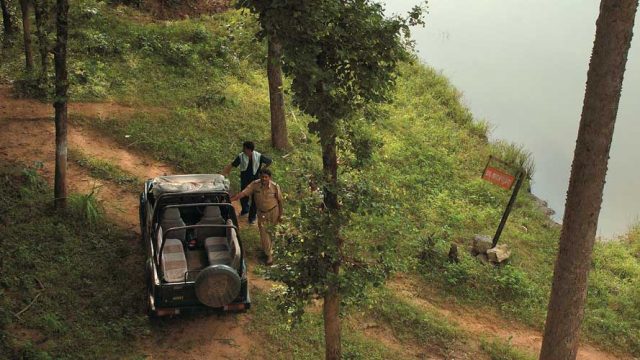Udanti is a well-kept secret meant only for the lucky few. The lucky few who can give up their bed tea in search of a breathtaking waterfall, who can take a bath without hand showers and can travel a 100 km on a dusty stone road.
Here’s a simple 1-2-3 way to get the essence of Udanti. Park your vehicle at a distance; kick off those shoes. Walk on the white silt. Hand pick a few fresh amla fruits lying on the ground; cup your hands and drink the crystal clear waters of the Devdhara stream. Lie down under the shade of the sal trees. Let the world carry on while you are in heaven.
ORIENTATION
The Udanti Wildlife Sanctuary occupies the southeastern portion of Gariaband Taluka of Raipur District. To its east lies the state of Odisha. Covering an area of 247 sq km, the sanctuary has been created for the protection of the wild buffalo. The sanctuary, by itself, can be covered in a day and Raipur being the nearest city, is the best option as a hub. However, if you wish to set aside time for wildlife spotting, give it at least another day or two. Making a day trip of it would mean missing out on the early mornings and late evenings, the best hours for spotting wildlife.
Park Entry Indians ₹30; Foreigners ₹200 Vehicle Entry ₹300 Timings Sunrise to sunset Photography ₹30, Videography ₹300 Guide ₹300

THINGS TO SEE AND DO
The flora in Udanti Wildlife Sanctuary chiefly comprises tropical dry peninsular sal forests and southern tropical dry deciduous mixed forests. Major flora in the sanctuary comprises teak, sal, salai, bamboo, mahul, semal, mahua, amla, tendu, harra and ber, among others. The wildlife found in Udanti Sanctuary includes wild buffalo, panthers, tigers, jungle cats, barking deer, sloth bears, wild dogs, porcupines, monkeys, jackals, bisons and striped hyenas, among others. The sanctuary also has a sizeable population of birds, of which the most prominent are parakeets, bulbuls, peafowl, drongos, pintails, rollers and herons.
It is a good idea to keep a map handy and to take along a guide. Also, it would be rather wise to chat up with the official at the entrance about what all you intend to see and take his brief on how to go about it and what routes to take.
Within the sanctuary, accommodation is available at the forest rest houses at Jugadh, Torenga, Karlajhar and Koyeba. Bookings for these are done only at the Principal Chief Conservator of Forests’ Office in Raipur and need to be done at least four days in advance.
Watchtower
The watchtower, 370 ft above sea level, is the best place to start your journey. It gives a snapshot of the 247 sq km sanctuary in a single frame. Going downhill will take you to streams, lakes and other water bodies that are popular watering holes for the animals.

Nagesh Talab
The Nagesh Talab, with its crystal clear waters, looks like a sheet of glass embedded into a green carpet. The talab attracts animals and is therefore the best place for wildlife sightings. However, the road was submerged after heavy rains. Access to the talab has been cut off until the road is repaired.
Devdhara Waterfall
This waterfall is 15 km from the park, via a kuccha road laden with rocks, pebbles and sharp gravel. The journey time is a little over an hour and as your car dashes forth, bamboo shoots and thick branches rub against your car. Feels like a true jungle safari.
You can hear the rumble of the falls almost 5 km ahead of the actual origination point. A little more effort and you can see the glorious waterfall that falls with a heady, lyrical sound onto the ground beneath. Devdhara is a point to point waterfall. That means that once it leaves its highest point, it simply descends down in one great leap 100 ft below. From 100 to zero in fraction of a second.
The waters from the Devdhara flow torrentially across sand, silt and rocks, through a forest of herbs and aromatic trees.
When to go November to June, avoid the monsoon Location Southeast of state capital Raipur, near the Odisha border, in east-central Chhattisgarh Air Nearest airport: Raipur Rail Nearest rail: Rajim
THE INFORMATION
Tourist/ Wildlife Offices
Head Office
Chhattisgarh Tourism Board
Paryatan Bhawan, GE Road, Raipur
Tel: 0771-4224600/ 11/ 22
Tollfree: 18001026415
W chhattisgarhtourism.net
Tourist Information Centre
Raipur Airport, Mana, Raipur
Tel: 6541303
Tourism Information Centre
Railway Station, Raipur
Cell: 09926781331
Chhattisgarh Tourism Board
Chanakya Bhavan, Chanakyapuri
New Delhi. Tel: 011-26116822
Principal CCF
Aranya Bhawan, Medical College Road
Raipur. Tel: 2552221
CCF Wildlife and Field Director
Raipur. Tel: 2429600
Chief Wildlife Warden
Raipur. Tel: 2552228
Udanti WLS
Tourist/ Wildlife Offices
Divisional Forest Officer, Udanti
Tel: 07706-241229
STD code 07706
Bastar
Chhattisgarh Tourism Board
Shahid Park, Jagdalpur
Cell: 09926944221
Kanger Valley NP
Director, Kanger Valley NP
Tel: 07782-228640
STD code 07782




